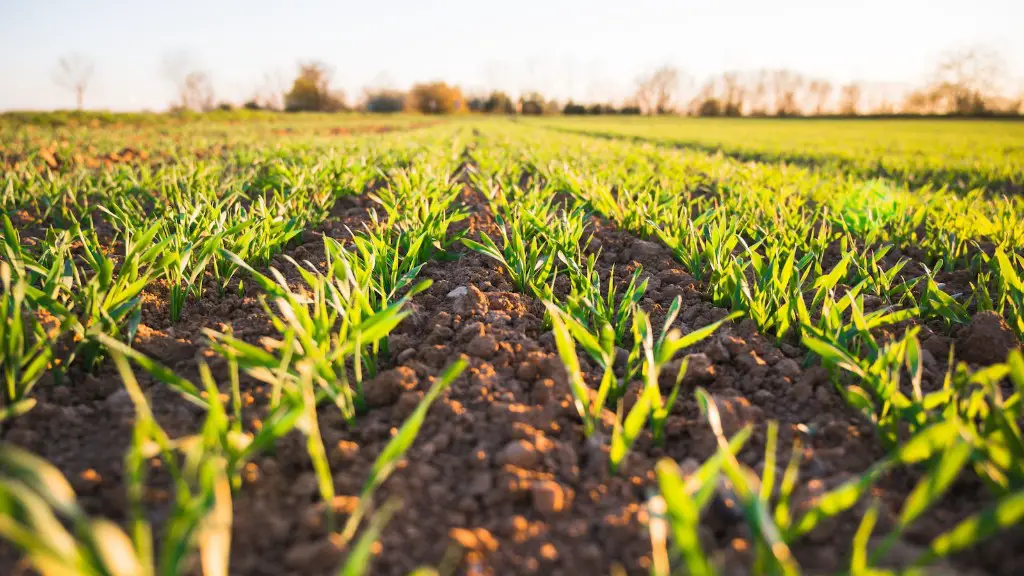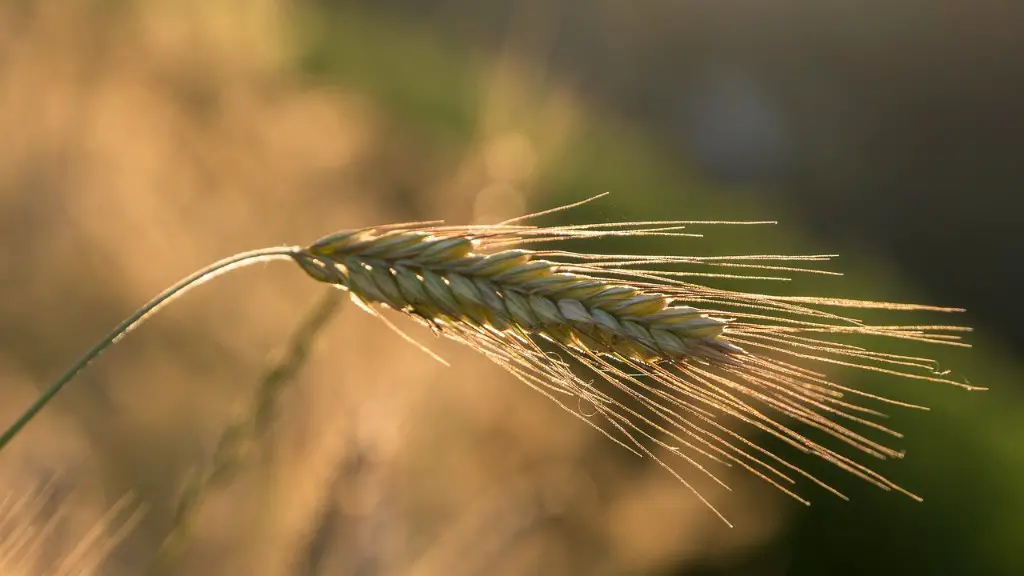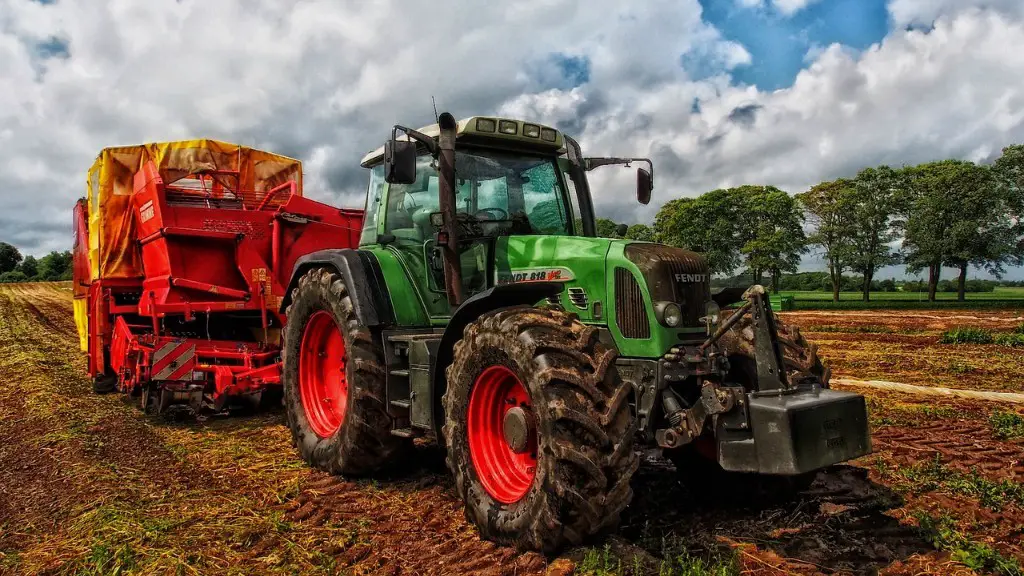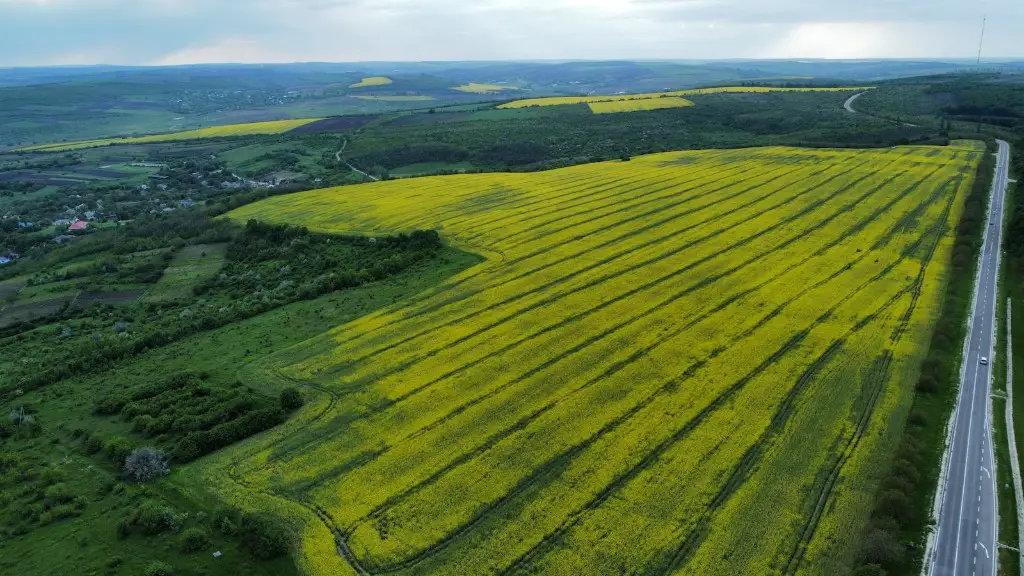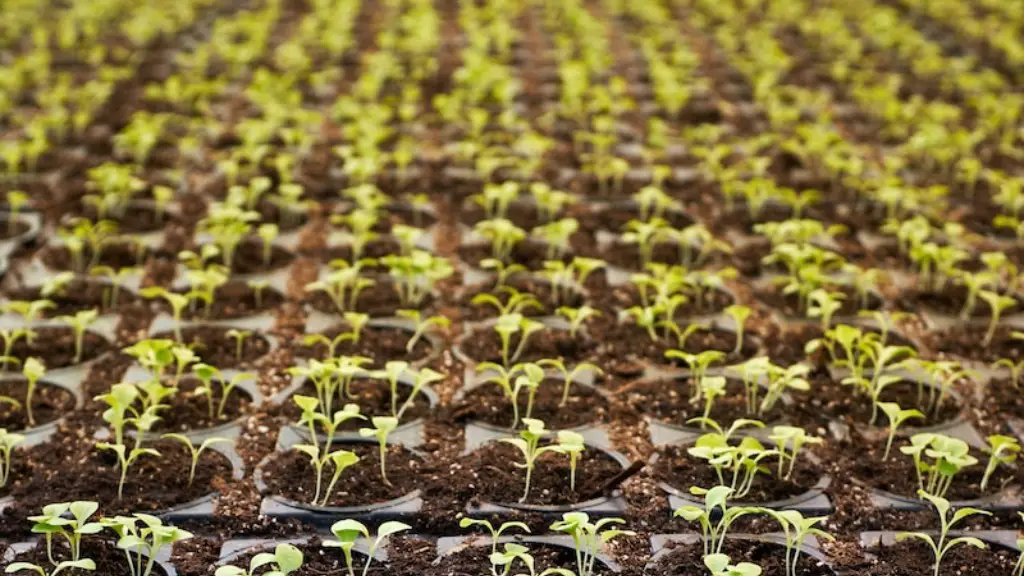Agriculture is a major contributor to climate change, with activities such as land use and land management largely responsible for the production of greenhouse gases. The production of food, livestock, and forestry activities all contribute to climate change, and agricultural production is the source of nearly 80 percent of methane and nitrous oxide emissions.
As land use changes, a great deal of carbon stored in the soil is released into the atmosphere through deforestation, monoculture, difficult soil operations, and non-sustainable farming practices. This carbon release further exacerbates the effects of climate change as carbon is an important greenhouse gas.
Agriculture may also contribute to higher levels of soil erosion, leading to lower levels of fertility, decreases in soil quality, and the release of more pollutants into the atmosphere. These pollutants, combined with the emissions generated by agricultural production, lead to ever-increasing levels of greenhouse gases and further climate change.
A major factor contributing to climate change and the ongoing agricultural crisis is the increasing demand for food and other agricultural products. Livestock production alone accounts for more than half of global food-related emissions, while agricultural production is responsible for more than 70 percent of global water usage. This demand for food is growing exponentially, and with it the pressures on agricultural production, which further contributes to increased levels of climate change.
Climate change is also affecting farming operations in a variety of ways, including changes in agricultural timing, temperature extremes, reduced growing seasons, and increasing drought intensity. This can lead to significant economic and social hardship for farmers, who must struggle to cope with shifting weather patterns, uncertain growing conditions, and the need for more frequent, costly adaptations.
Agricultural production systems that are able to adapt to changing climate patterns and are resilient to extreme weather events are essential in tackling climate change. International agreements, such as the Paris Agreement, provide an impetus for governments and farmers to implement more sustainable farming methods, including sustainable intensification, precision agriculture, and agroforestry. These methods can significantly reduce the carbon footprint of agricultural production, and improve soil quality, fertility, and resilience.
In addition, there is also great potential for carbon sequestration and storage in agricultural soils through techniques such as no-till techniques, residue management, and manure management. These techniques can be used to draw carbon out of the atmosphere and store it in the soil, helping to reduce levels of harmful greenhouse gases.
Impacts on Biodiversity
The increasing levels of climate change caused by agricultural production are having a major impact on biodiversity and ecosystems around the globe. The destruction of natural habitats and ecosystems is reducing key wildlife habitats, leading to habitat loss, species loss, and population declines.
Rapid changes in climate and environmental conditions are also having a major impact on the agricultural sector. These changes can include decreases in crop yields, increasing pest and disease pressures, and the disruption of pest, weed, and disease cycles due to unseasonable temperatures. These changes can lead to unpredictable growing conditions and huge economic losses for farmers.
Agricultural production also has a huge impact on water resources. Intensive agricultural practices can lead to water stress, especially in areas with limited water resources, which can result in water shortages, water contamination, and decreased water quality. This can be further exacerbated in regions that are highly dependent on agricultural production for their livelihoods.
In addition, agricultural production can also be a major source of polluting emissions. These emissions, including irrigation and fertiliser run-off, can contaminate nearby waterways and have a huge impact on aquatic ecosystems and water quality.
It is clear that agricultural production has the potential to cause extensive environmental damage and drastically accelerate climate change. It is therefore essential that agricultural production is adapted to become more sustainable to reduce its environmental impacts and ensure the ongoing survival of the planet.
Mitigation Strategies
In order to mitigate the effects of agricultural production on climate change, there are a number of strategies that can be employed. These strategies include: increasing the rotation of crops and crop diversity, using integrated pest management, using crop rotation and cover cropping, conserving soil and water, and using renewable energy.
Integrated pest management (IPM) is an effective technique for reducing the damage caused by pests and weeds. It encourages the use of natural predators to control pest populations and relies on minimum applications of pesticides and other chemicals. This can significantly reduce emissions while ensuring the safety of the environment.
Crop rotation and cover cropping are also highly effective strategies for improving the sustainability of agricultural production, enabling farmers to successfully utilise their land whilst reducing the risk of soil erosion and compaction. They also help to improve soil quality, fertility, and carbon sequestration, reducing the impact of climate change.
Conserving soil and water can also help to reduce agricultural production’s contribution to climate change. Through conservation practices, such as no-till and water catchment, soil can be retained and their water resources protected from the impacts of pollution, runoff, and erosion. Employing these practices can significantly reduce agricultural production’s contribution to climate change.
Finally, the use of renewable energy sources can help to reduce emissions from agricultural production. Energy use in agricultural production is constantly increasing, and switching to renewable sources of energy such as solar, wind, geothermal, and biomass can significantly reduce agriculture’s contribution to climate change.
Reducing Food Waste
Reducing food waste is an important strategy for mitigating climate change. Millions of tons of food are wasted in production, transportation, and consumption each year, leading to a large amount of emissions released into the atmosphere. By reducing food waste, emissions can be prevented and the damaging effects of climate change can be reduced.
Farmers, supermarkets, and consumers can all work together to reduce food waste. On the farm, food waste can be reduced through improved storage methods and better harvesting techniques, while supermarkets can reduce waste by implementing better forecasting and stocking practices. In the home, consumers can waste less by only buying what they need and by making use of food storage solutions such as freezing, canning, fermenting, and pickling.
Reducing food waste also benefits the environment in other ways. By avoiding food waste, more food is available to those living in food-insecure households, resulting in less poverty and hunger around the world. Finally, reducing food waste is an important step towards achieving global sustainability, which is key to fighting climate change.
Political Interventions
Political interventions are important in combatting the effects of agricultural production on climate change. Governments have the power to set laws, regulations, and policies that promote environmentally-friendly practices, provide financial incentives to sustainable farmers, and enforce environmental standards.
Governments can also play an important role in raising public awareness of climate change, enabling citizens to understand and appreciate the need for farmers to adopt more sustainable methods of production. Finally, governments can work with scientists, farmers, and industry to promote research and development into new and more efficient technologies that can reduce emissions from agricultural production.
It is clear that the effects of agricultural production on climate change are real and can have devastating impacts on humans and the environment. Reducing food waste, implementing sustainable practices, and pursuing political interventions are all important strategies for mitigating these effects and fighting climate change.
Policy Changes
Policy changes are also essential in tackling the environmental impacts of agricultural production and climate change. Governments should ensure that incentives are given to farmers and other agricultural producers who adopt more sustainable practices, while penalties should be enforced on producers who cause environmental damage.
Governments should also ensure that agricultural subsidies are used to promote sustainable agricultural practices, such as organic farming, agroforestry, precision agriculture, and integrated pest management. These subsidies can help to cover the costs of investing in more sustainable methods of production, making them more accessible to the average farmer.
Finally, governments should also focus on promoting education and research into sustainable agriculture. Developments in technologies such as data science, robotics, and artificial intelligence can significantly reduce the environmental impact of agriculture, while also boosting yields and improving economic efficiency.
It is clear that policy changes, in combination with sustainable practices and technological advancements, can play a major role in reducing agricultural production’s contribution to climate change. Governments must act now to reduce the impact of agriculture on the planet and ensure the future of the planet and its inhabitants.
